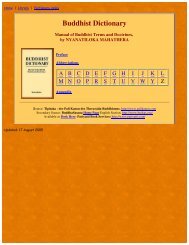The Three Basic Facts of Existence II: Suffering (Dukkha) - Buddhist ...
The Three Basic Facts of Existence II: Suffering (Dukkha) - Buddhist ...
The Three Basic Facts of Existence II: Suffering (Dukkha) - Buddhist ...
- No tags were found...
Create successful ePaper yourself
Turn your PDF publications into a flip-book with our unique Google optimized e-Paper software.
<strong>II</strong>I. A Description <strong>of</strong> <strong>Dukkha</strong>All living beings have at all times sought for what may be called “happiness.” In the past theirsearch was for the same goal—happiness, while in the present we can observe ourselves andother beings and see that it is happiness—the satisfaction <strong>of</strong> desires and pleasant feelings, thatwe seek. In the future who can doubt that we shall go on searching for that most elusivepossession—happiness.This continual seeking is the most fundamental search <strong>of</strong> all. Living beings, not men alone, hopeto experience only what is pleasing, while at the same time wishing to avoid the unpleasant anddisagreeable. What they and we hope to experience for as long as possible is called sukha, heretranslated “happiness,” which is basically pleasant feelings <strong>of</strong> mind and body. And what allbeings try to avoid are all sorts <strong>of</strong> painful, undesired experiences which may be either mental orphysical, called dukkha. As this word covers such a wide range <strong>of</strong> our experience in life, all <strong>of</strong> itunsatisfactory in some way or other, it will be left in Pali so that its meaning may emerge fromthe description below <strong>of</strong> dukkha’s many aspects. <strong>Dukkha</strong> is a word that all <strong>Buddhist</strong>s shouldknow and understand.When one wishes to avoid or overcome an enemy, it is needful to know what he is like, whathis characteristics are. Similarly with dukkha, the enemy, it seems, <strong>of</strong> our happiness, which wemay either try to avoid as much as we can, or strive to overcome, according to our aspirationand the amount <strong>of</strong> hard work that we are prepared to do on ourselves. So we should take agood look at this dukkha to find out what it means and then to see its force in our own lives. Itis no use pretending to ourselves or to others that dukkha does not exist, or that it nevertroubles us. That is the ostrich way <strong>of</strong> avoiding enemies, and very ineffective it is. We have toopen our own eyes and understand why we suffer in various ways. When we have admitted toourselves the weariness <strong>of</strong> carrying this great burden <strong>of</strong> pain and sorrow, then we shall beprepared to try to put it down, to go on our way burdenless and happy.First, let us consider whether the way <strong>of</strong> the world is likely to lead us away from our burdenand towards the happiness we seek. In the ordinary way <strong>of</strong> things people assume, led on byeconomic pressure, through advertising, etc., that by the complete satisfaction <strong>of</strong> their desires,through the possession <strong>of</strong> this or that object or experience, they will reach that peaceful andblissful state, continuous happiness. Of course, this is just a carrot in front <strong>of</strong> the donkey. Sothey are always struggling after this or that but even if attained it provides only transientpleasure. If not attained—dukkha! <strong>The</strong> way <strong>of</strong> materialism then does not promise an end <strong>of</strong>dukkha, only an increase <strong>of</strong> it. <strong>The</strong> formula is “increase sensual desire, increase dukkha.”But one would have thought that men, generally being regarded as intelligent, would havegreater abilities to realise their own happiness than do the less fortunate beings, that is, if onedid not know human history. In it are found all the terrible sufferings brought on by upset <strong>of</strong>the elements such as earthquakes, floods, fires, typhoons and disease, augmented a thousandtimes by the rapacity, cruelty, callousness and stupidity <strong>of</strong> men, human beings like ourselves.One might argue the other side, that there have been many good and noble men, even greatteachers, who would all show to men ways out <strong>of</strong> their dukkha. But what has happened tothem? <strong>The</strong>y have had to contend all the time with the evil-minded, to suffer persecution bythem, forced into flight and hiding, and even been killed. <strong>The</strong>n men have been responsible formaking innumerable wars—the world has never been without a few in progress, as we see fromthe present. Besides this, there is torture and all the other hatred-rooted actions, down to theslighting word and look <strong>of</strong> contempt. Yet people still look for happiness! Too many here areintent still not only upon making others suffer, but in creating suffering for themselves. We find5
















